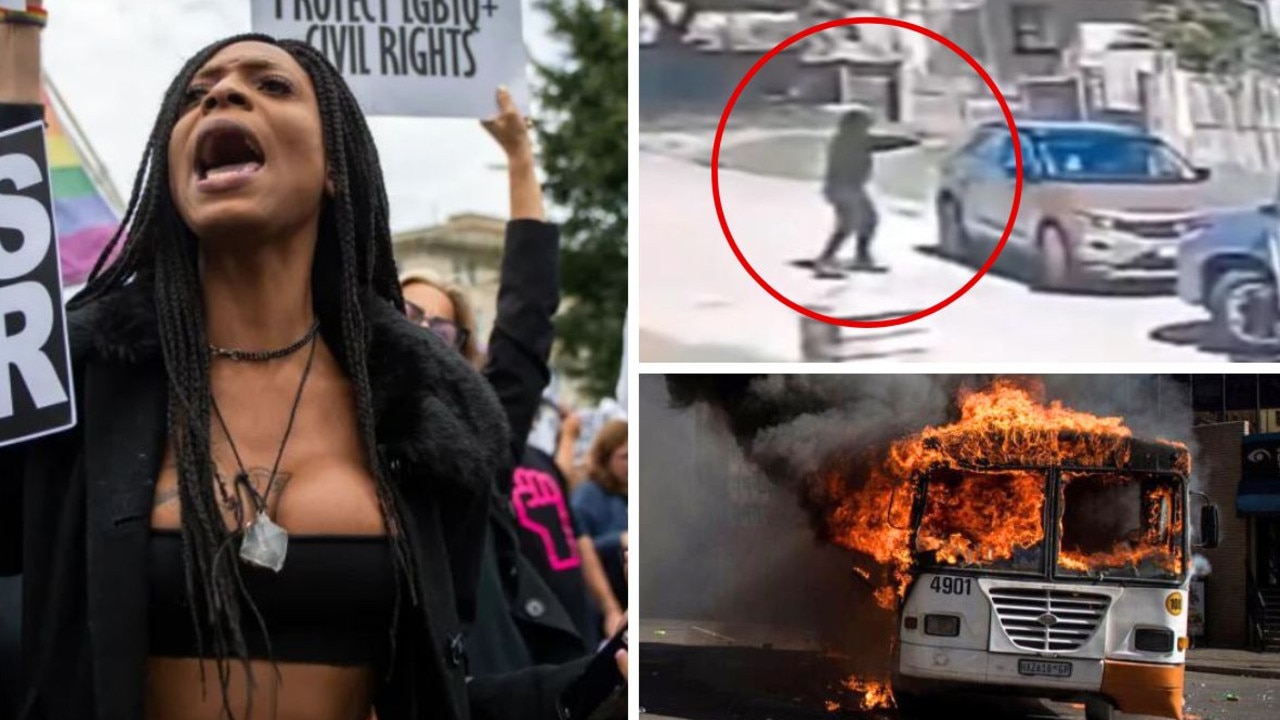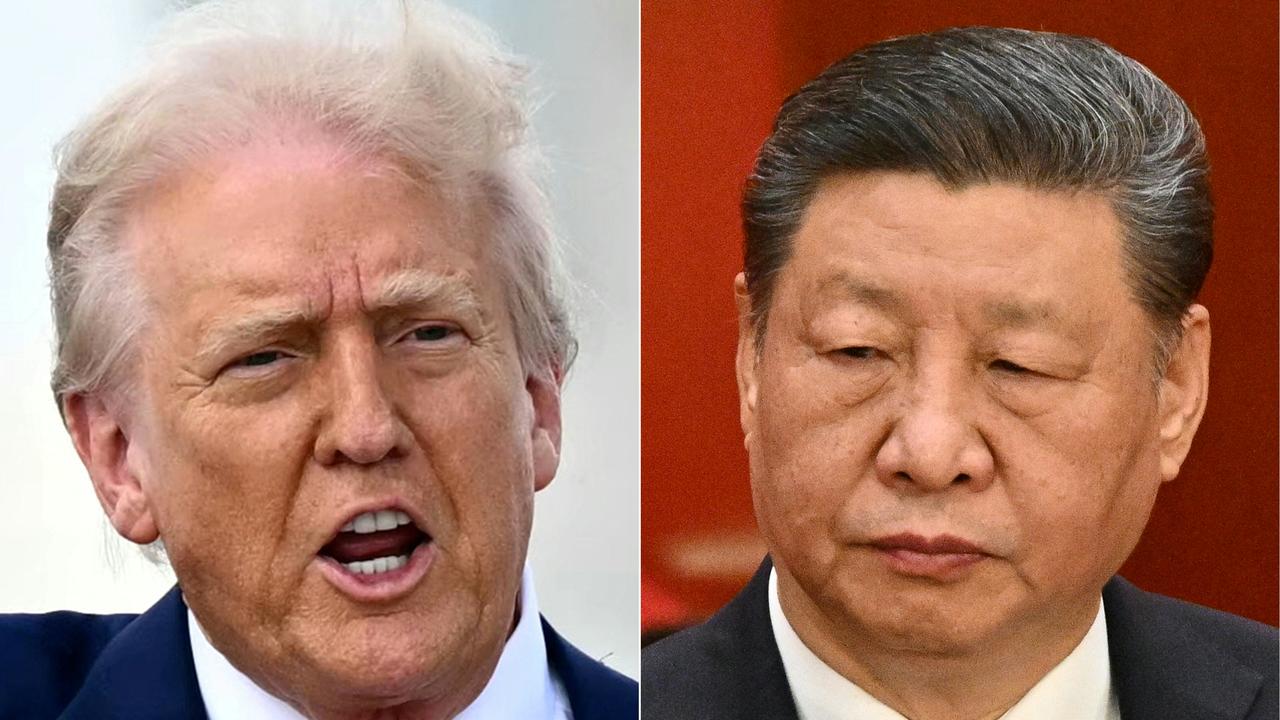Ukraine-Russia war: Russia once again blames Ukraine for terrorist attack
A car bomb has killed a Kremlin-appointed official in Lugansk, Ukraine as Moscow demanded Kyiv extradite suspects over claims they planned the concert hall terrorist attack.
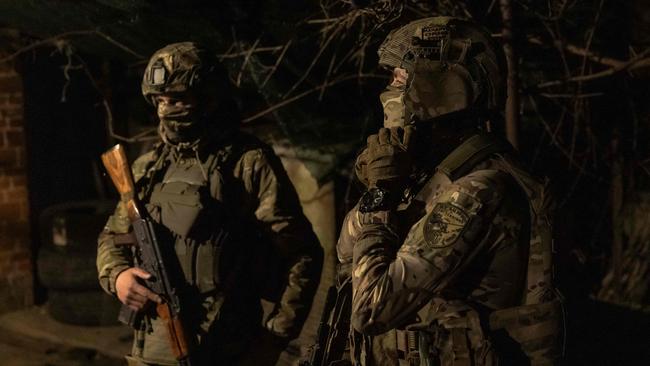
World
Don't miss out on the headlines from World. Followed categories will be added to My News.
A car bomb in Russian-controlled territory in Ukraine’s eastern Lugansk region killed a Moscow-appointed government official on Monday, local authorities said.
The local branch of Russia’s Investigative Committee, which probes major crimes, said the deputy head of a state-run administrative agency was killed when “an unidentified device detonated in a car” on Monday afternoon.
A car bomb in Russian-controlled territory in Ukraine’s eastern Lugansk region killed a Moscow-appointed government official on Monday, local authorities said.
— Business Recorder (@brecordernews) April 1, 2024
Read More:https://t.co/4jJ1tCnqbD#bomb#kill#governmentofficialpic.twitter.com/OZi7etm4pa
Several Moscow-installed officials in eastern Ukraine have been killed in apparent attacks orchestrated by Kyiv or pro-Kyiv forces since Russia launched its military offensive in February 2022.
The Investigative Committee posted a photo of a light-coloured SUV with its windows and doors blown out and wreckage strewn across the street in Starobilsk, a town in Lugansk.
“The circumstances of the incident and the people involved in the commission of the crime are being established,” it said, adding that an investigation into a “terrorist act” had been opened.
Municipal head Vladimir Chernev named the victim as Valery Chaika, an official in Lugansk.
“Our comrade is dead,” he wrote in a post on Telegram, calling on residents to be attentive and report any suspicious activity to the authorities.
Lugansk is one of the four eastern Ukrainian regions that Moscow claimed to annex in 2022.
MOSCOW STILL BLAMES UKRAINE FOR TERROR ATTACK
Russia has asked Ukraine to extradite several Ukrainians, including its security chief Vasyl Maliuk, over claims they were behind terrorist acts in Russia.
The Russian foreign ministry repeated a claim that the March 22 terrorist attack on a concert hall outside Moscow was linked to Ukraine and accused it of being behind a number of other attacks and assassinations.
This is despite an affiliate of Islamic State having claimed responsibility of the concert hall attack.
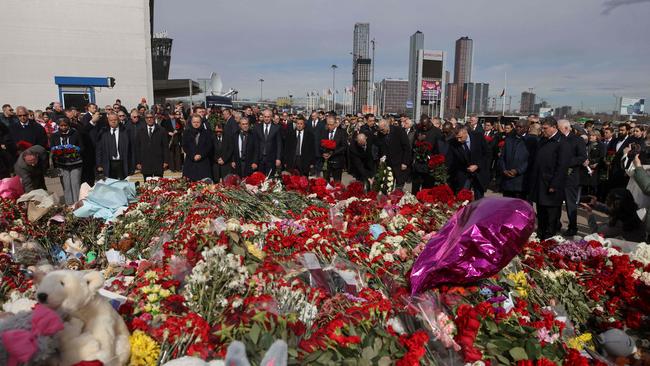
In a statement, the Russian foreign ministry said it had demanded Ukraine “immediately arrest and extradite” a number of people and that security chief Maliuk had admitted to having “organised the bombing of the Crimean Bridge in October 2022 and revealed details of the organisation of other terrorist attacks”.
Crimea was annexed by Russia in 2014 but is internationally recognised as part of Ukraine.
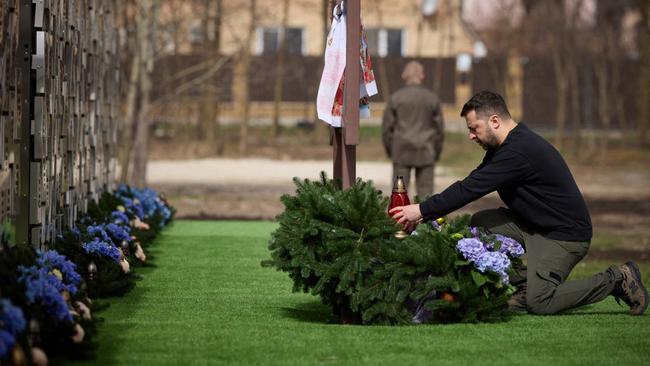
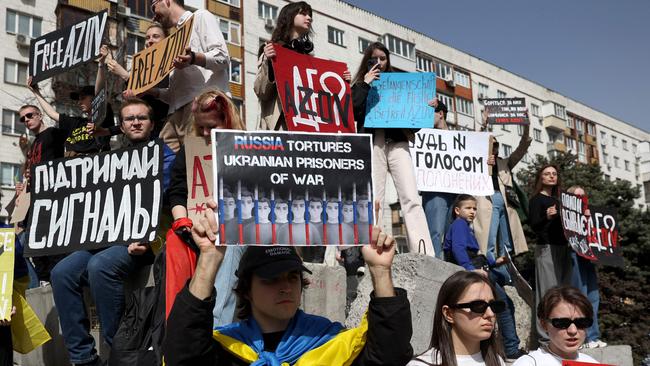
“The Russian side demands that the Kyiv regime immediately cease any support for terrorist activities, extradite those responsible and compensate for the damage caused to the victims,” the ministry said.
It was not clear how Russia conveyed its demands, as Ukraine severed diplomatic ties with Moscow shortly after Russia invaded Ukraine in February 2022.
Ukraine’s SBU security service balked at Russia’s statement, which it called “worthless” and “cynical”.
“Statements about terrorism are especially cynical coming from a terrorist country,” it said.
Maliuk earlier this week dismissed Moscow’s calls to arrest him, after giving a television interview detailing extra-judicial killings of Ukraine’s opponents in Russia.
PUTIN RAMPS UP ARMED FORCES
Vladimir Putin has called up 150,000 men to join the Russian army, making it the country’s highest-ever conscription drive in almost a decade.
According to a report in The Sun, the Russian leader seems to be ramping up his force to prepare for a feared spring offensive against Ukraine amid wavering Western support for Kyiv.
Mr Putin signed a decree setting out the spring conscription campaign, calling up 150,000 citizens for compulsory military service.
These recruits, aged 18 to 30, will be conscripted between April and July to fuel his invasion of Ukraine.
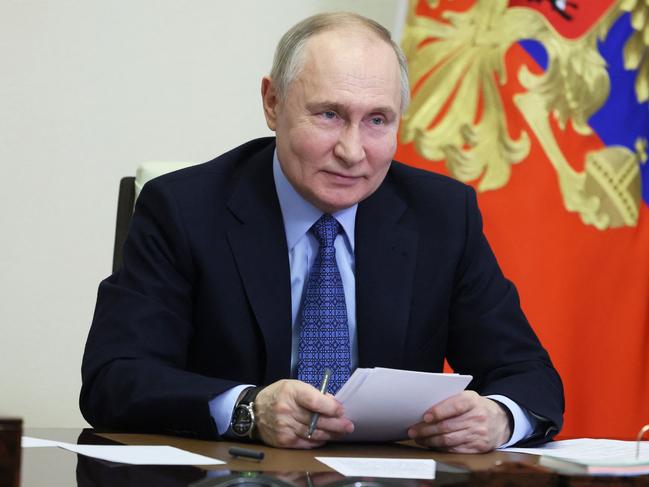
Previously, Mr Putin raised the maximum age to join the army from 27 to 30 to compensate for Russian war losses.
Pravda Gerashchenko, an influential Russian Telegram channel, said: “It is possible to achieve such a quantity of fresh ‘cannon fodder’ thanks to an amendment to raise the conscription age.
“Russians aged 18 to 30 will serve.”
Russia has promised that those forcibly enlisted for the compulsory one-year military service will not be sent to the war zone in Ukraine.
However, such vows have previously been broken with forced conscripts being sent to the front lines.
The new recruits could also be sent to Russian zones under heavy Ukrainian attack such as Belgorod and Kursk.
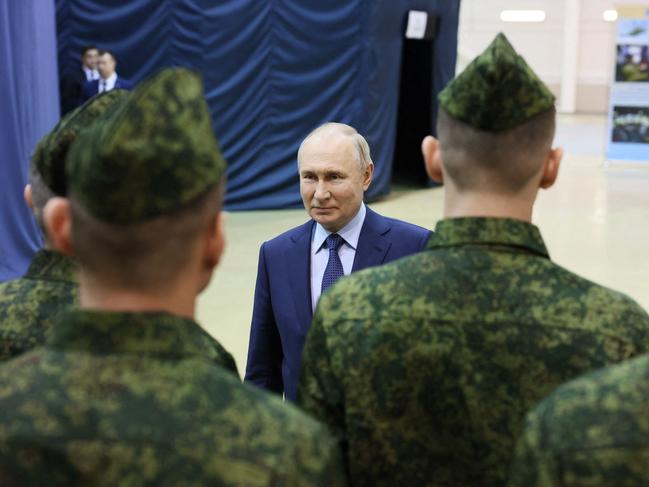
And they are often forced to sign contracts as full-scale soldiers against their will, only to be sent to the front lines.
The highest-ever conscription drive comes as Mr Putin is expected to launch his feared military offensive against Ukraine in the coming months.
With Ukraine dealing with a shortage of weapons and wavering support from the West, Mr
Putin’s call for fresh army recruits further strengthens his plans to defeat the smaller country and launch an attack against NATO.
A bombshell military report leaked in January revealed Mr Putin’s step-by-step plan to bring the West to the brink of World War III.
The secret files, obtained by Bild from Germany’s Ministry of Defence, laid out exactly how the Kremlin boss might be preparing for a hybrid attack on NATO as early as the next northern hemisphere winter and a full-blown war next summer.
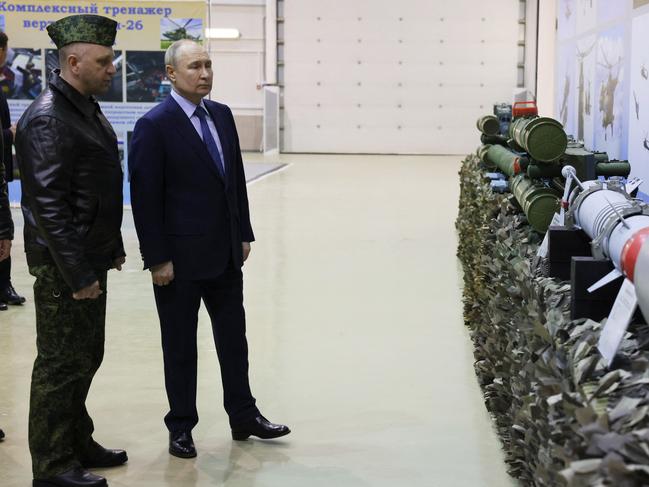
It suggested that Moscow could be planning to launch a northern hemisphere spring offensive against Ukraine to secure a victory in June, which would then be followed up with hybrid attacks on the West.
In the meantime, Mr Putin may plan to build up troops and missiles on NATO’s eastern flank, trying to antagonise the West and destabilise the Baltics.
Such a move would bring the West and Russia to the brink of war – and the report suggests the Russian leader is gearing up an invasion for the summer of 2025.
Mr Putin has also ramped up his nuclear threats against NATO as he warned any F-16 jets supplied by the West will be shot down.
He also vowed attacks on NATO airfields if Ukraine used them to launch the game-changing supersonic fighters against Russia.
F-16s are one of the prized Western weapons that Ukraine has been trying to seek for a long time.
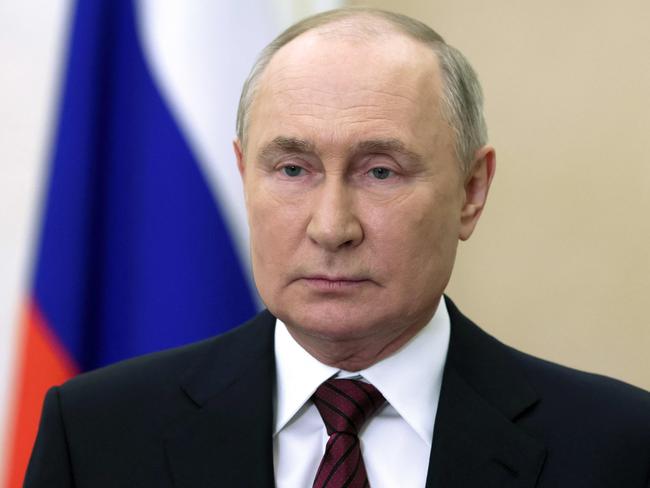
Last year, the US gave the go-ahead for allies to send Ukraine the long-awaited F-16 warplanes to fight Russia in the skies.
NATO allies like Belgium, Denmark, Norway and the Netherlands have all pledged to donate F-16s to Ukraine.
But Mr Putin has warned that F-16s are “carriers of nuclear weapons” – and Russian forces would completely destroy them just like any other military equipment.
“If they put in F-16s – they are talking about it, they are training [Ukrainian] pilots, this will not change the situation on the battlefield,” he said.
“The F-16s are also carriers of nuclear weapons.
“And we will destroy their aircraft in the same way that we destroy their tanks, armoured vehicles and other equipment, including multiple rocket launchers.”
Mr Putin even went on to say that he would target and attack any third country that launches these supersonic jets against Russia.
“Of course, if they are used from third-country airfields, they become a legitimate target for us, wherever they are,” he said.
“We will also have to take this into account when organising combat operations.”
‘REAL THREAT’: WARNING THAT HAS EUROPEAN EDGE
Meanwhile, Polish Prime Minister Donald Tusk has warned of the “real” threat of conflict in Europe, saying that for the first time since the end of World War II the continent has entered a “pre-war era”.
“War is no longer a concept from the past. It is real, and it started over two years ago. The most worrying thing at the moment is that literally any scenario is possible. We haven’t seen a situation like this since 1945,” Mr Tusk said in an interview with the European media grouping LENA on Friday.
“I know it sounds devastating, especially for the younger generation, but we have to get used to the fact that a new era has begun: the pre-war era. I’m not exaggerating; it’s becoming clearer every day.”
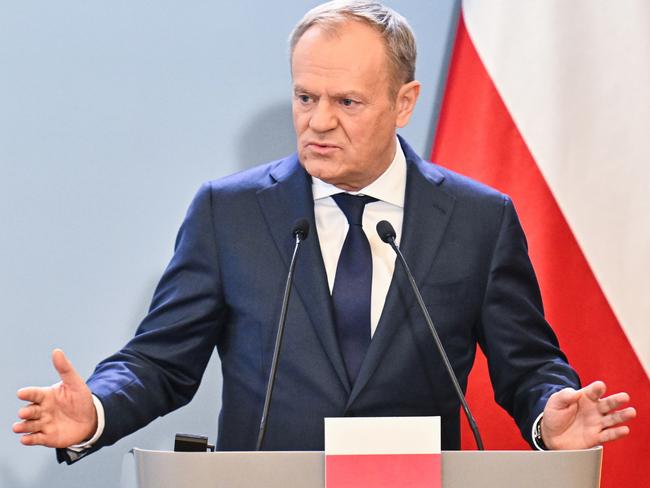
Russia’s invasion of Ukraine more than two years ago up-ended European leaders’ sense of unshakeable post-war peace, prompting many countries to gear up weapons production to supply both Kyiv and their own militaries.
Former European Council president Mr Tusk, whose country has been one of the staunchest supporters of neighbouring Ukraine, said that if Kyiv lost, “no one” in Europe would feel safe.
Also front of mind for the continent is the potential return of former US president Donald Trump, whose openly NATO-sceptic posture has raised questions over the reliability of American military assistance should he be re-elected in November.
“Our job is to nurture transatlantic relations, regardless of who the US president is,” Tusk said in the interview.
FRANCE TO SEND ARMOURED VEHICLES, MISSILES TO UKRAINE
France’s defence minister said Paris would deliver “hundreds” of armoured personnel carriers and anti-aircraft missiles as part a new aid package to Ukraine in its war against Russian invaders.
“To hold such as extensive front line, the Ukrainian army needs for example our VAB vehicles: it’s absolutely essential for troop mobility,” Sebastien Lecornu told La Tribune newspaper in an interview published late Saturday.
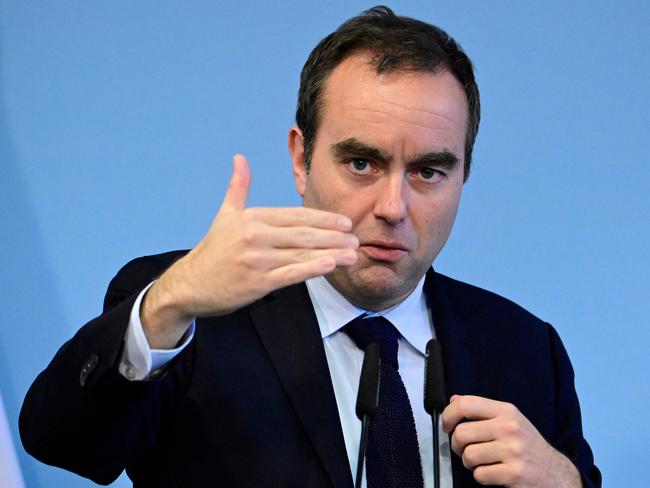
France is currently phasing out its VAB fleet – some of them more than 40 years old – with new Griffon armoured vehicles, but Lecornu said the older models were “still operational”.
“We’re talking about hundreds of them for 2024 and early 2025,” he said.
Paris will also supply more Aster 30 anti-aircraft missiles for SAMP/T launchers, similar to the US-supplied Patriot air defence systems.
“We are also developing remotely operated munitions in a very short time frame, to deliver them to Ukraine starting this summer,” Lecornu added.
RUSSIAN, BELARUSIAN ATHLETES ‘NOT WELCOME’ AT OLYMPICS
Paris mayor Anne Hidalgo said Russian and Belarusian athletes “were not welcome” at the Olympics being staged in the French capital this year.
“I want to tell Russian and Belarusian athletes that they are not welcome in Paris and to tell Ukrainian athletes and all the Ukrainian people that we support them very strongly,” Ms Hidalgo said in a video posted by Ukrainian YouTube channel, United News.
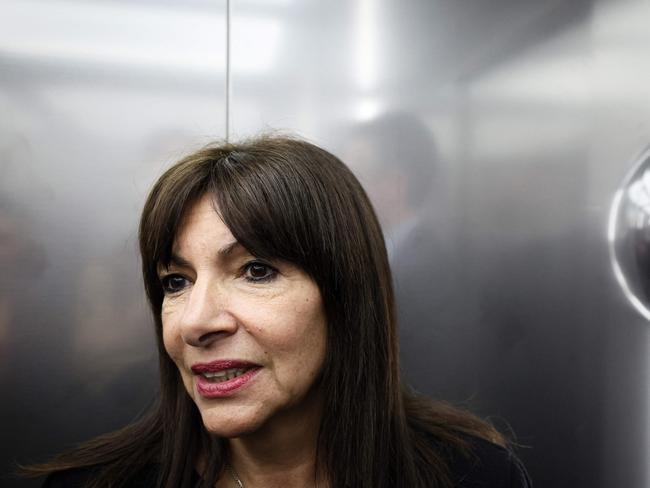
Ms Hidalgo made her comments on a trip to Kyiv where she visited a training centre for Ukrainian athletes.
Russian athletes can compete in the Paris Olympics, which run from July 26 until August 11 but only as neutrals.
Russia and Belarus have been banned from taking part in the opening ceremony which will be staged on the River Seine in the heart of the city.
RUSSIAN SHELLING KILLS ELDERLY
Ukraine said that Russian shelling killed two elderly people in the eastern town of Krasnogorivka overnight on Friday, and urged civilians still living there to evacuate.
Krasnogorivka lies directly on the frontline in the eastern Donetsk region, more than half of which is under the control of Russian forces and is an active combat zone.
“The town was under enemy fire during the night and morning. A 70-year-old woman and a 73-year-old man were killed,” Donetsk regional head Vadym Filashkin said on social media.“
Krasnogorivka has been on the frontline for 10 years and remains one of the most dangerous places in the country.
5000 KIDS EVACUATED
Five thousand children have been evacuated from Russia’s Belgorod region bordering Ukraine following weeks of deadly bombardment by Kyiv.
Regional authorities last week said 9000 minors would be moved to other regions after a spate of cross-border shelling and drone strikes killed over a dozen civilians.
“Five thousand of our children are already outside the region. Yesterday, 1300 children arrived in Saint Petersburg, Bryansk, and Makhachkala,” governor Vyacheslav Gladkov said on Saturday.
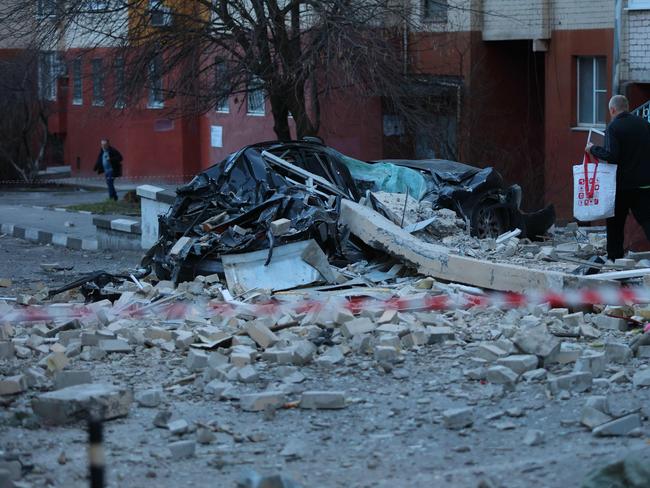
Children who remain in the region and live in municipalities close to the border, including the region’s capital Belgorod, will switch to remote learning next month, he added.
He said businesses that had been forced to close due to the attacks will be allowed to re-open as long as “staff are trained in first aid” and windows are taped up.
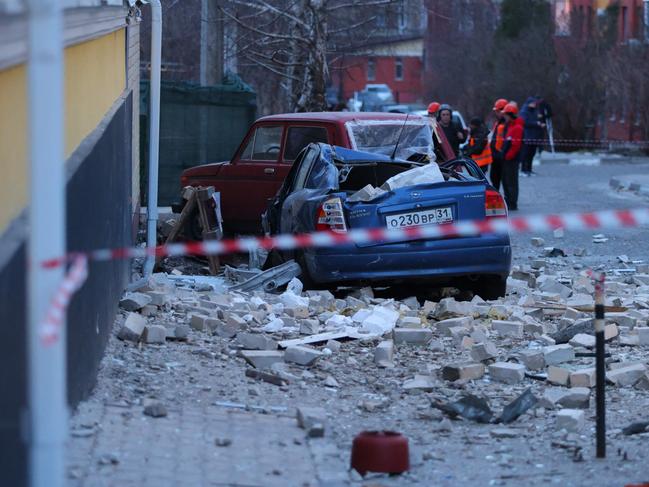
Belgorod has been repeatedly targeted by what Russian officials have called indiscriminate Ukrainian attacks since the conflict began more than two years ago.
On Friday, a Ukrainian drone crashed into a multistorey apartment building in Belgorod city, killing a man and wounding two others, including his wife, Gladkov said.
‘RUSSIA’S ADVANTAGE ABOUT SIX TO ONE’
Russia is outgunning Ukrainian forces sixfold on the front lines, Ukraine’s recently appointed commander-in-chief Oleksandr Syrsky has revealed in a rare interview.
“A few days ago, the enemy’s advantage in terms of ammunition fired was about six to one,” Syrsky told the Ukrinform news agency.
“The defence forces are now performing tasks along the entire vast front line, with little or no weapons and ammunition,” he warned, saying the situation was “tense” in some areas.
Mr Syrsky took over as commander-in-chief in February after Ukrainian President Volodymyr Zelenskyy fired his popular predecessor, Valery Zaluzhny.
Mr Syrsky added that in recent months and weeks, Russia had “significantly increased aviation activity, using KABs – guided aerial bombs that destroy our positions”.
Ukraine is pushing for the United States Congress to pass a long-stalled $US60bn military aid package for Kyiv.
“We hope to receive from our partners more air defence systems and, most importantly, missiles,” Syrsky said.
“We would be even more grateful if this aid came faster and in sufficient quantities.”
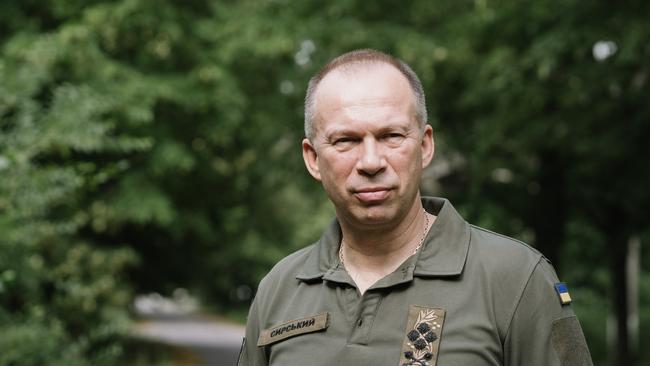
RUSSIA BOMBARDS UKRAINE ENERGY INFRASTRUCTURE
Russia fired dozens of drones and missiles at Ukraine’s energy infrastructure wounding at least six people and cutting off power in several regions, officials said on Friday.
Moscow has stepped up its aerial bombardment of Ukraine in recent weeks, targeting electricity facilities in response to an uptick in deadly Ukrainian assaults on Russia’s border regions.
Ten regions across Ukraine came under attack, damaging critical infrastructure and wounding at least six people, the interior ministry said.
“Last night Russia continued its barbaric attacks against the Ukrainian energy system. Emergency blackouts have been introduced in some regions,” Prime Minister Denys Shmygal said.
“Ukraine needs more air defence systems to secure critical infrastructure and protect the population. This is the main topic of discussion with our international partners,” he said.
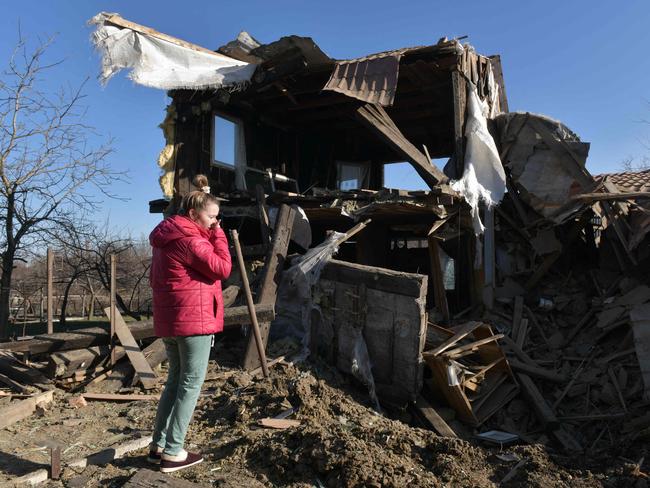
The air force said Russia had targeted Ukraine’s “fuel and energy sector” with a total of 99 missiles and drones overnight, 84 of which were shot down.
One of the country’s main energy providers, DTEK, said three of its thermal power stations had been attacked in the barrage, leaving facilities “severely damaged”.
“After the attack, the power engineers promptly started to deal with the consequences,” the company said in a statement online, adding that one employee had been wounded.
The energy ministry said the attack damaged power infrastructure in four regions across central and western Ukraine, causing blackouts and disrupting train traffic.
‘CHEMICAL COURAGE’ FUELS MOSCOW ATTACKERS
Four men behind a terror attack on a Moscow concert hall are believed to have been high on a drug dubbed ‘chemical courage’.
Traces of Captagon pills – used by Islamic State (ISIS) to disable fear in fighters – showed up in blood tests taken from the suspects behind the Crocus City Hall massacre, news outlet Baza reports, citing sources in Russian law enforcement.
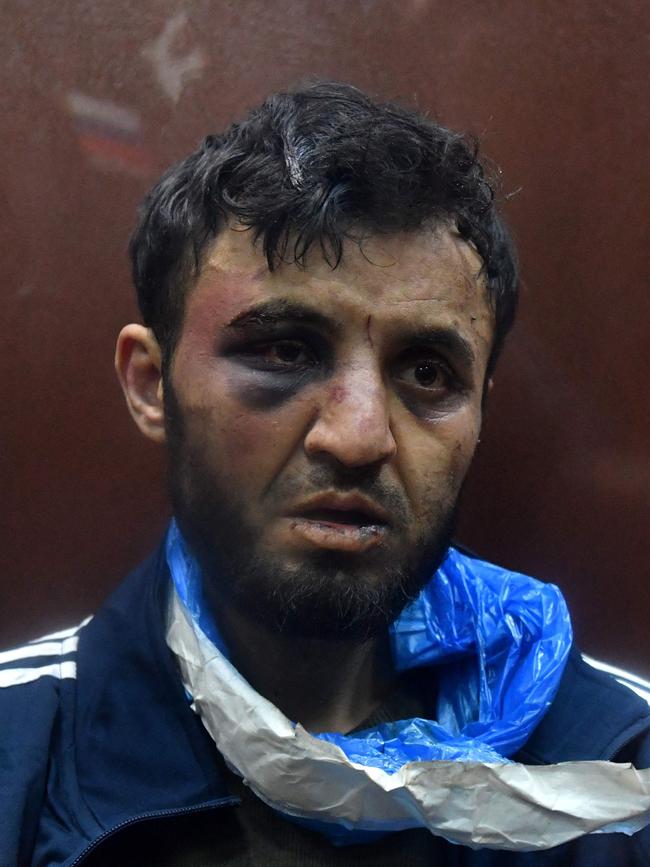
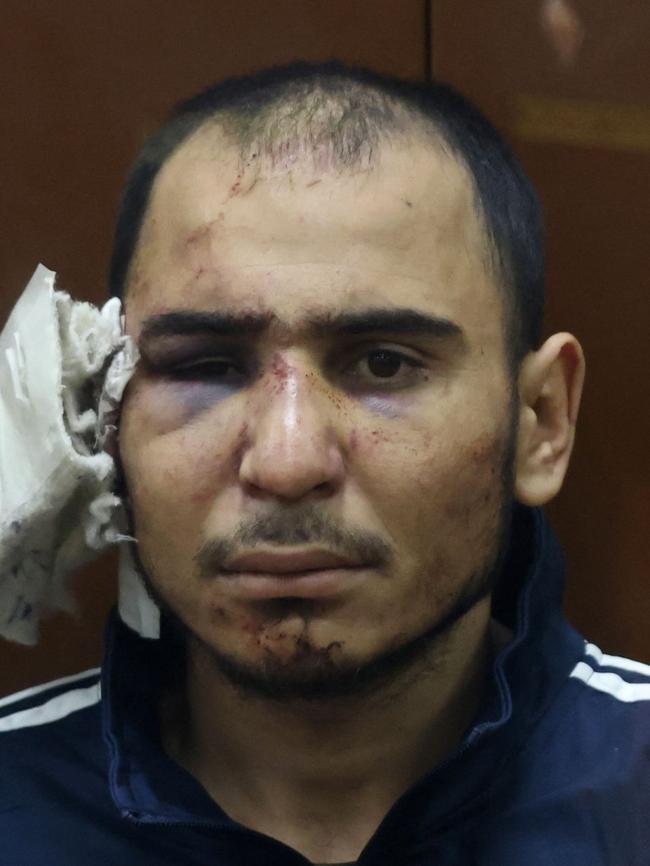
The drug, known as Captagon pills, was previously used by Hamas militants in the lead up to the barbaric October 7 attacks in Israel.
The attack on the Moscow concert hall last Friday was the worst in Russia for years.
At least 139 people were killed and scores injured as gunmen stormed the complex, days after President Vladimir Putin began his fifth term of office.
ISIS claimed responsibility for the attack.
‘NO AGGRESSIVE INTENTIONS’: PUTIN’S SURPRISING CONFESSION
Vladimir Putin has revealed he has no plans to attack any NATO country nor Poland, the Baltic States or the Czech Republic but warned if the West supplies F-16 fighter jets to Ukraine then they will be shot down.
“We have no aggressive intentions towards these states,” Mr Putin said while meeting air force pilots on Wednesday, according to a Kremlin transcript released the next day.
“The idea that we will attack some other country – Poland, the Baltic States, and the Czechs are also being scared – is complete nonsense. It’s just drivel.”
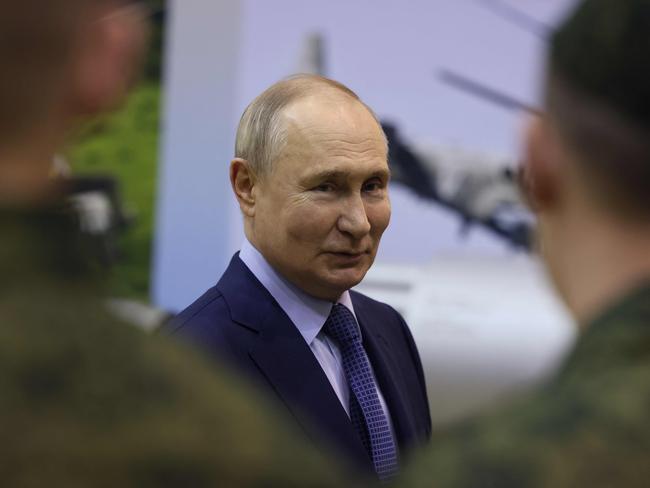
Asked about F-16 fighters which the West has promised to send to Ukraine, Mr Putin said such aircraft would not change the situation in Ukraine.
“If they supply F-16s, and they are talking about this and are apparently training pilots, this will not change the situation on the battlefield,” Mr Putin said.
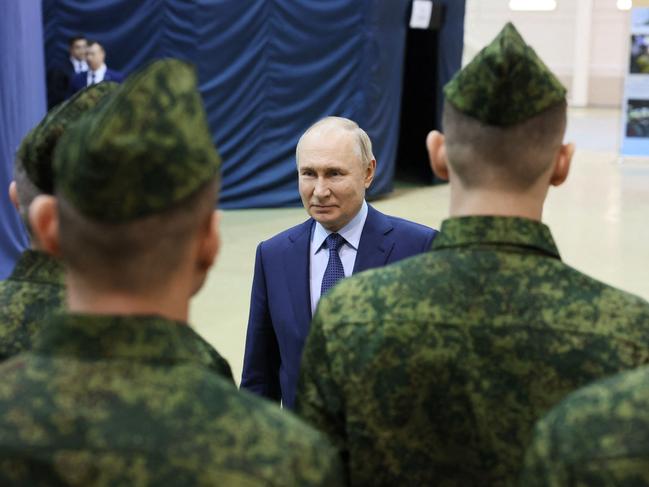
“And we will destroy the aircraft just as we destroy today tanks, armoured vehicles and other equipment, including multiple rocket launchers.”
A day earlier Ukrainian Foreign Minister Dmytro Kuleba said that F-16 aircraft should arrive in Ukraine in the coming months.
ZELENSKYY’S PLEA AMID RUSSIAN STRIKES
Ukraine downed 26 drones as Russia launched its latest salvo of aerial attacks, a senior Ukrainian military official said on Thursday.
“On the night of March 28, 2024, the enemy launched a missile air strike against Ukraine using three Kh-22 cruise missiles and an Kh-31P anti-radar missile (from the Black Sea), an S-300 anti-aircraft guided missile (Donetsk) and 28 attack UAVs of the ‘Shahed-136/131’ type”, Mykola Oleshchuk, the head of Ukraine’s air force, wrote on Telegram.
“Twenty-six attack UAVs of the ‘Shahed-136/131’ type were destroyed within Odessa, Kharkiv, Dnipropetrovsk and Zaporizhzhia regions”, he said, without providing details on the missile strikes.
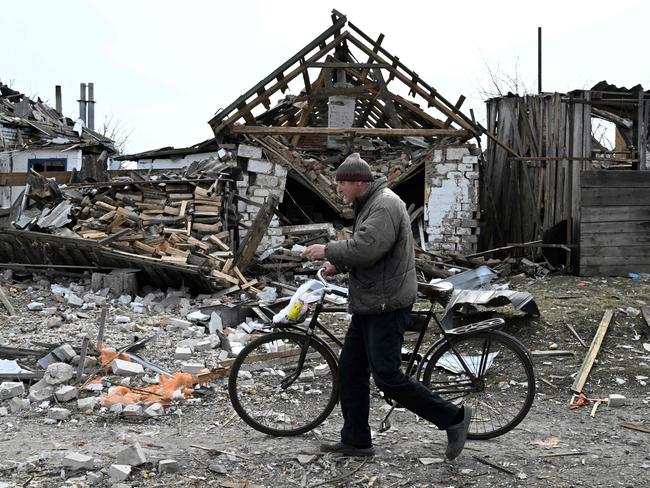
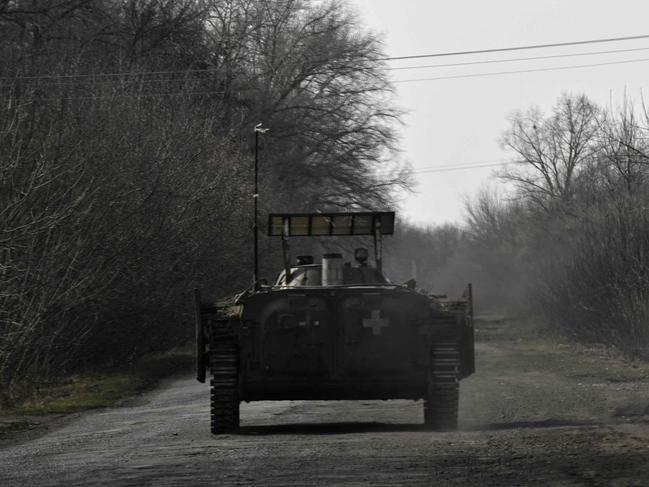
Russia regularly launches air attacks on Ukraine overnight and has escalated the strikes over the past few weeks, targeting key infrastructure, including power stations, in retaliation for fatal bombardments of Russia’s border regions.
On Wednesday Russian strikes killed three people in eastern and southern Ukraine.
President Volodymyr Zelenskyy has urged Ukraine’s allies to speed up deliveries of warplanes and air defence systems to bolster Kyiv’s air defences.
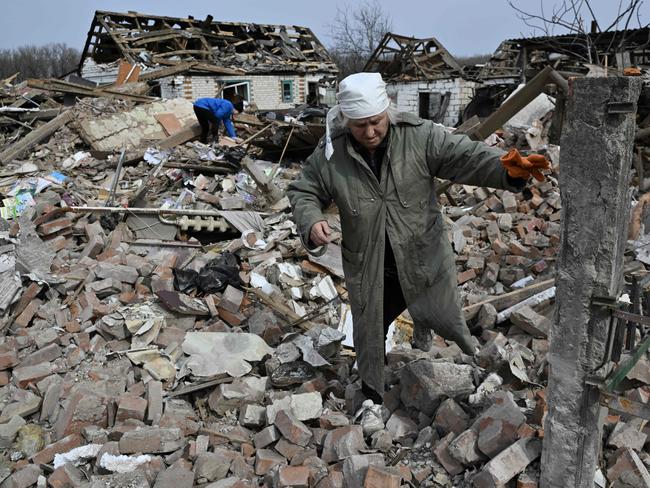
– with AFP
More Coverage
Originally published as Ukraine-Russia war: Russia once again blames Ukraine for terrorist attack
Read related topics:Russia & Ukraine Conflict



